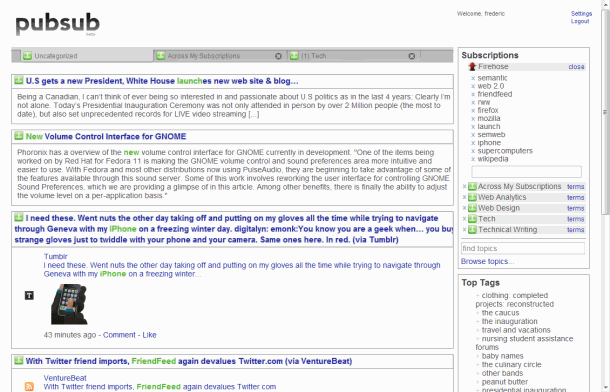In 2002, PubSub released an interesting and useful product that provided a real-time search engine for RSS feeds, flight information, Usenet posts, and even earthquake updates. Sadly, PubSub closed its doors in 2007 and its assets were bought by Something Simpler. Today, however, we received an email from Something Simpler, stating that PubSub will relaunch within the next 90 days. We also get a chance to get a sneak peek at the new PubSub, which received a complete facelift, but still provides a great real-time search experience.

Real-Time News Updates from Across the Web
While it looks different, PubSub still provides the same set of core features it did a few years ago. You can either give it a number of keywords to search for, or subscribe to a topic. The choice of topics is extremely broad (think ‘Nintendo,’ ‘Micronesia,’ and ‘Hepatitis’). Every time a blog posts an article that either includes one of your keywords or fits into one of the categories that you subscribe to, PubSub will update your search results in real-time.
Because PubSub is part of the Ping-o-Matic blog update system, these updates often happen only seconds after a story went live.

The version we got access to is still a bit buggy (and we wouldn’t expect anything else from an early beta product), but it clearly shows a lot of promise. If you are in an industry where getting information as early as possible is important to you, then the return of PubSub is going to be a game-changer for you.
Twitter and Others
Interestingly, the new PubSub also seems to import some Twitter feeds, though without having access to the Twitter Firehose, these updates usually seem to take almost half an hour before they appear on the service. We also saw some updates from public Yahoo groups. It is not quite clear yet, however, whether the new PubSub will also allow you to import your own set of RSS feeds.
Clearly, this is the kind of service that Google, thanks to owning the ubiquitous FeedBurner service, could easily have created itself, but as we pointed out last week, Google seems to have missed the boat on the real-time web.

















